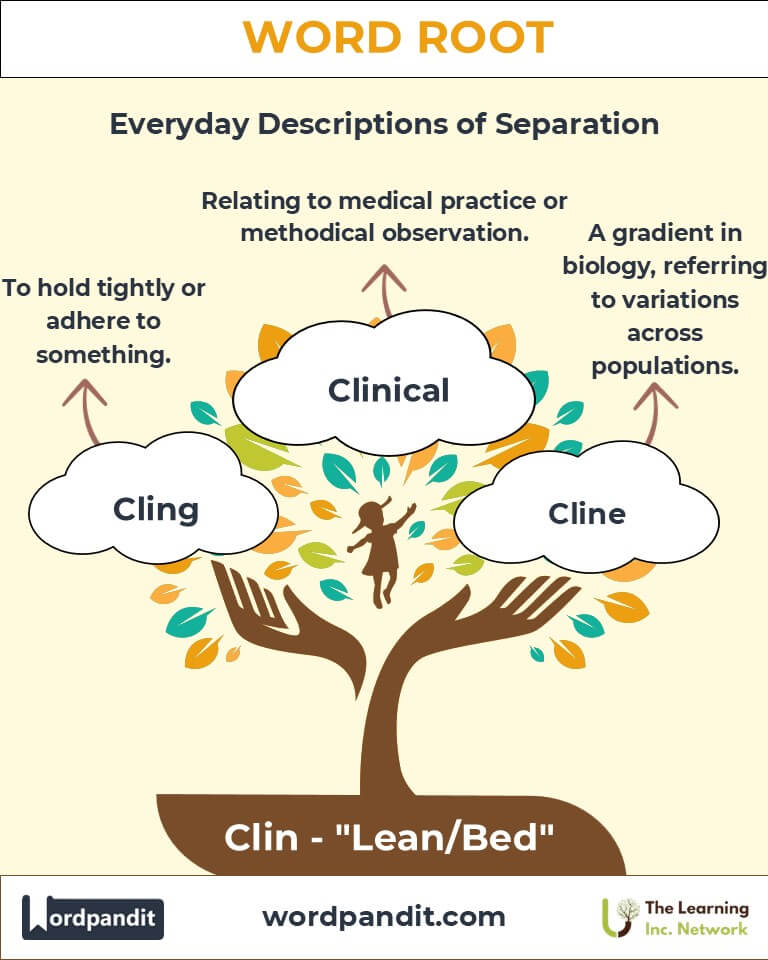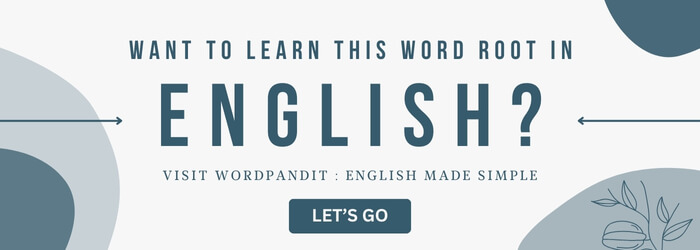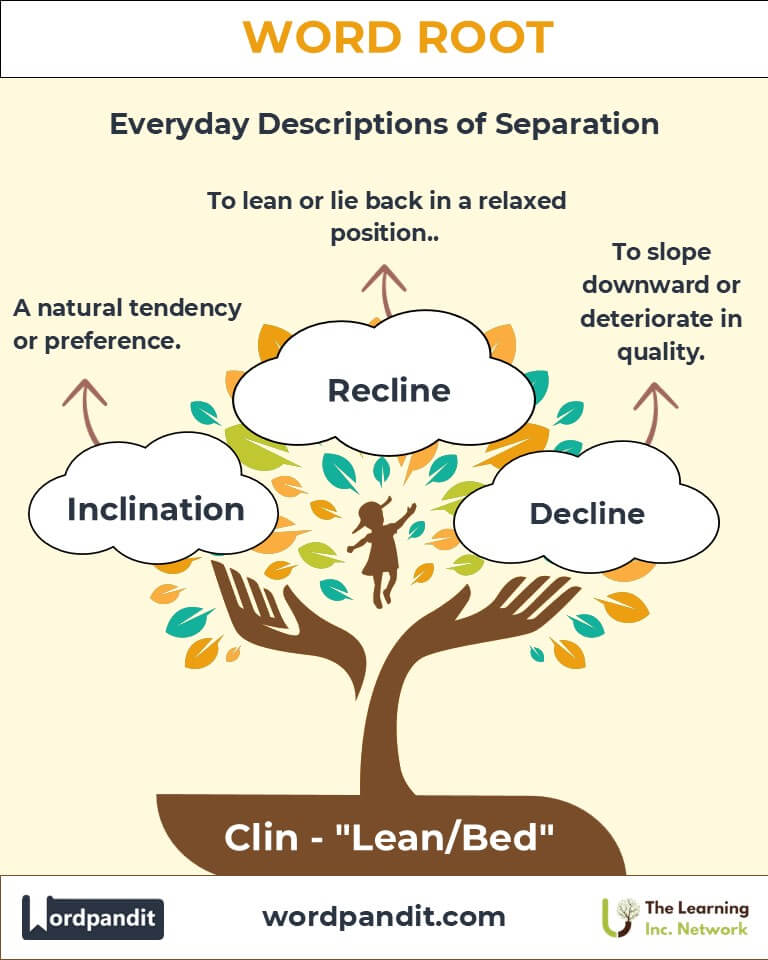Clin: The Art of Leaning and Resting in Language
Discover the rich legacy of the root "clin," meaning "lean" or "bed," derived from Latin. From "recline" to "clinical," this root has shaped our understanding of rest, support, and specialized knowledge across diverse disciplines.

Table of Contents
- Introduction: The Essence of "Clin"
- Etymology and Historical Journey
- Mnemonic: Unlocking the Power of "Clin"
- Common "Clin"-Related Terms
- "Clin" Through Time
- "Clin" in Specialized Fields
- Illustrative Story: "Clin" in Action
- Cultural Significance of the "Clin" Root
- The "Clin" Family Tree
- FAQs about the "Clin" Word Root
- Test Your Knowledge: "Clin" Mastery Quiz
- Conclusion: The Legacy of "Clin"
1. Introduction: The Essence of "Clin"
What do reclining chairs, clinical observations, and inclination have in common? They all trace their origins to the root clin, meaning "lean" or "bed." Pronounced simply as "klin," this versatile root connects ideas of physical and metaphorical support. From comfortable rest to methodical analysis, "clin" has given rise to words that highlight structure, stability, and focus.
2. Etymology and Historical Journey
The root clin derives from the Latin clinare, meaning "to lean" or "bend." Early usage referred to physical postures, such as reclining at a banquet or lying in bed. Over centuries, "clin" evolved into metaphorical contexts, influencing words that describe intellectual inclinations or specialized environments, such as clinical settings.

3. Mnemonic: Unlocking the Power of "Clin"
To remember the root clin, picture a recliner chair leaning back, symbolizing comfort and rest.
Mnemonic Device:
"Clin is where you lean to relax or learn."
4. Common "Clin"-Related Terms
- Recline (ree-klīn): To lean or lie back in a relaxed position.
Example: "She reclined on the sofa after a long day." - Inclination (in-kluh-nay-shun): A natural tendency or preference.
Example: "His inclination toward music became evident in childhood." - Decline (dee-klīn): To slope downward or deteriorate in quality.
Example: "The steep decline made the trail challenging to navigate." - Clinical (klin-uh-kuhl): Relating to medical practice or methodical observation.
Example: "The doctor’s clinical approach reassured the patients." - Cling (klin-g): To hold tightly or adhere to something.
Example: "The child clung to her mother during the storm."
5. "Clin" Through Time
- Incline (Old Usage): Initially referring to a physical slope or lean.
Evolution: It now also describes preferences or tendencies. - Clinical (Modern Usage): Once restricted to bedsides, this term expanded to describe detached and methodical approaches in various fields.
6. "Clin" in Specialized Fields
- Medicine:
- Clinical: Focuses on direct patient care or observation.
- Example: "Clinical trials are pivotal in advancing medical science."
- Engineering:
- Incline: Refers to gradients or slopes in structural designs.
- Example: "Engineers calculate inclines for safe road construction."
- Psychology:
- Inclination: Describes tendencies in human behavior or thought.
- Example: "Studies explore inclinations toward risk-taking."
7. Illustrative Story: "Clin" in Action
Sophia, a medical intern, spent long hours in a clinical ward, observing patient responses to treatment. One evening, she reclined briefly on a bench, reflecting on her inclination toward pediatrics. Inspired by the trust children placed in her, she resolved to pursue her dream. The next day, she presented her observations from a clinical trial with clarity and confidence, earning accolades from her peers.
8. Cultural Significance of the "Clin" Root
The root clin reflects humanity's focus on support and balance, both physically and metaphorically. Ancient practices, like reclining at banquets, symbolized luxury and leisure, while clinical settings in modern medicine embody precision and care.

9. The "Clin" Family Tree
- Lean (English): To rest or rely on something.
Example: "He leaned against the wall for support." - Slope (Old English): An inclination of land or surface.
Example: "The gentle slope led to the riverbank." - Cline (Greek): Refers to gradients in biology.
Example: "A cline shows variations across species populations."

FAQs About the "Clin" Word Root
Q: What does the root "clin" mean?
A: The root "clin" means "lean" or "bed" and originates from the Latin word clinare, meaning "to lean or bend." It describes both physical inclinations, like reclining furniture, and metaphorical leanings, such as personal preferences or inclinations.
Q: What is the difference between "recline" and "incline"?
Recline: To lean or lie back in a resting position, often associated with relaxation.
Example: "She reclined in her chair to watch the sunset."
Incline: To lean forward or upward, or to have a tendency toward something.
Example: "The steep incline made hiking the trail challenging."
Q: How is the word "clinical" used outside of medicine?
A: Originally, "clinical" referred to bedside medical practices, but today it describes a detached, objective, or methodical approach in various contexts.
Example: "The scientist analyzed the data with clinical precision, ensuring no personal bias affected the results."
Q: What does "inclination" mean in psychology?
A: In psychology, "inclination" refers to a natural tendency, preference, or predisposition toward certain behaviors or thoughts.
Example: "His inclination to help others made him an excellent counselor."
Q: Are "clin" and "cline" related?
A: Yes, while "clin" refers broadly to leaning or bending, "cline" is more specific, often used in biology to describe gradual changes across a gradient.
Example: "A temperature cline shows how animal adaptations vary with altitude."
Test Your Knowledge: "Clin" Mastery Quiz
1. What does the root "clin" mean?
2. Which word describes a downward slope?
3. What does "clinical" mean in medicine?
4. Which word describes a natural tendency or preference?
12. Conclusion: The Legacy of "Clin"
The root clin continues to shape our language, symbolizing rest, observation, and inclination. Its presence across disciplines—from engineering to psychology—highlights its relevance in understanding balance and structure. Let the legacy of clin inspire you to lean into learning and find stability in life’s challenges.














